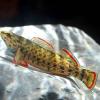exotic removal ethics and legalities
#1
 Guest_IndyEsox_*
Guest_IndyEsox_*
Posted 06 August 2011 - 09:19 AM
Old timers used to simply throw on the bank any fish they considered to be "trash fish". I suppose that was any fish they would not eat like gar, carp, etc. What would be an appropriate way to destroy fish in the field?
What about exotic shell fish? Here in Indiana I understand it is illegal to molest or even collect the shells of all shell fish. What are the ethics if say you come across Zebra Mussels?
#2

Posted 06 August 2011 - 10:01 AM
In Virginia, the VDGIF webpage states: "Anglers are not required to report snakeheads nor are they required to kill them if caught, but the Department asks that the fish be reported and killed if possible. However, if an angler wishes to keep a legally caught northern snakehead, the fish must be killed to be in possession, and the angler must call the hotline and report the angler's last name, date of catch, location of catch and size."
Source: http://www.dgif.virg...akehead-faq.asp
Most anglers carry a sizable blade with them and will probably just sever the spine at the base of the head, or just remove the head completely. I personally feel this is a better option for a quick death rather than throwing the fish on the bank to slowly suffocate. Snakeheads can 'gulp' air (like gar and bowfin) and stay alive much longer. So if you're not squeamish, a soldiers death would be preferred.
#3

Posted 06 August 2011 - 10:56 AM
"...would it be desirable to catch and destroy these fish?" This is somewhat of a subjective question, but yes, it would be desirable to me. But I would also realize that it would be largely futile. Carp have a long history in North America and your actions are unlikely to have a significant impact on the overall population. But I am fond of the nobility of a futile battle.
"What are the ethics of removing other exotic species? What about Asian Carp? Or any other type of exotic?" My answer would be the same as above. Except for some species, we might still be earlier enough to stop the spread.
"What would be an appropriate way to destroy fish in the field?" Campfire, fork and knife would be my preference. According to some carp were brought here originally as a food fish. I have had them, they taste fine (like anything else you are subject to the skills of the chef). I am going to eat everyday anyway... why not impose my carnivorous ways on an exotic instead of a native?
Now, if you really want to have an impact on the carp population, improve the habitat. There are studies showing that carp do best when introduced into warm contaminated waters, and do not thrive in clear cool streams. Here are some references from USGS.
http://nas.er.usgs.g...spx?speciesID=4
Can you say riparian zones? Or land management. Or maybe even education and awareness of the fish. Now we are right in NANFA's wheelhouse. Now I have to admit, that changing the whole habitat is probably also a futile endeavor. I mean what if the pollution is from farm run-off? That is certainly a long battle to fight. But there are ways to have an impact there as well, including education and awareness. Not something that you will see overnight results from. But again, it may be worth the fight. And in the mean time, have a fish fry.
#4
 Guest_EricaWieser_*
Guest_EricaWieser_*
Posted 06 August 2011 - 12:01 PM
I guess that wouldn't work with an 18" carp. These people have some carp cooking recipes to share: http://www.catfish1....map/t-2590.html
Edited by EricaWieser, 06 August 2011 - 12:02 PM.
#5
 Guest_Mike_*
Guest_Mike_*
Posted 06 August 2011 - 12:13 PM
Snakeheads are a food fish as well.
I only get gobies on Lake Michigan's lake front, and in such a location its fun to throw them to the seagulls.
The only thing I would throw on the bank is zebra mussels.
Edited by Mike, 06 August 2011 - 12:14 PM.
#6
 Guest_frogwhacker_*
Guest_frogwhacker_*
Posted 06 August 2011 - 01:49 PM
What about exotic shell fish? Here in Indiana I understand it is illegal to molest or even collect the shells of all shell fish. What are the ethics if say you come across Zebra Mussels?
Here's how I see it.(for what it's worth). I am guessing that your premise is that, in this situation, it is unethical to break the law by destroying the invasive specimen and also unethical to allow the specimen of an invasive species to live due to the detrimental effects on native species. We therefore have a dilemma; Which action is "more" unethical? As I see it, it is only ethical for an individual to break a law, if and only if, obedience to that law directly causes an immoral action, and this individual is completely willing to honestly and openly accept the responsibility and consequences of his or her disobedience to that law for the remainder of their life. Realistically, and unfortunately, the destruction of a few zebra mussels will have little to no impact on the invasion of this species. This, therefore, minimizes the question of ethics in regard to the destruction of a few specimens of the invasive species and clearly points to obedience to the law as the most ethical choice of action. I know this sounds kind of heavy, and I apologize for that, but this is a serious question and a very good one at that.
BTW, I keep and eat hybrid bass because I consider them to be invasive, and I'm legal while doing it. They don't taste as good as crappie, but I blame hybrid bass for the fact that I don't catch as many crappies in the rivers as I did 25 years ago.
Edited by frogwhacker, 06 August 2011 - 01:51 PM.
#7
 Guest_MichiJim_*
Guest_MichiJim_*
Posted 06 August 2011 - 03:00 PM
Michael Wolfe is correct that habitat is key - changes in habitat create opportunities for exotics. We have introduced some species just because we trashed the habitats more than the natives can handle.
I would do whatever it took to keep an exotic out of a currently uncontaminated habitat. And our newly introduced species, like round gobies or ruff, maybe the best thing is to kill every one we see.
I fish the Grand River and the shorelines of the Great Lakes for smallmouths. But every once in a while, a carp grabs on and things get interesting. Some of the carp in the Great Lakes push 30 to 40 pounds on a regular basis. Hook one on light tackle and its thrilling, right up to when they take off for Milwaukee and that's the end of it. Would I kill the carp I land? No, I let them go. Not going to change the balance of the population one way or the other. I have eaten carp, but I am less charitable than others on this forum regarding their edibility.
Another interesting case - it appears that Orange-Spotted Sunfish are colonizing into my state. Coming up from Ohio, and they seem to like some of the degraded rivers in SE Michigan.
Its been happening for some time, and virtually no research is being done, but are these exotic? Should we go out and kill everyone we find?
For me, I am on the "it depends" line, but I cannot advocate killing anything unless there is a real purpose in doing so. If someone else wanted to do so, as long as I didn't have to smell the rotting corpse on the river bank, that is their call.
#8
 Guest_haruspicator_*
Guest_haruspicator_*
Posted 06 August 2011 - 03:05 PM
Also, beware of disposing of any fish that appears wasteful, cruel, or that may cause a health concern. Dragging the carp out of the pool to kill them may cause someone to call the warden saying you are killing bass or something like that. Not sure, but in some places it is illegal to capture them without a rod/reel.
#9

Posted 06 August 2011 - 03:29 PM
There you go, frying pan fisheries management!BTW, I keep and eat hybrid bass because I consider them to be invasive, and I'm legal while doing it. They don't taste as good as crappie, but I blame hybrid bass for the fact that I don't catch as many crappies in the rivers as I did 25 years ago.
#11
 Guest_tomterp_*
Guest_tomterp_*
Posted 11 September 2011 - 08:07 PM
I stopped to look off a bridge and saw a small pool that contained about six 18" carp. Since this is an exotic, providing I had a proper fishing license, would it be desirable to catch and destroy these fish? What are the ethics of removing other exotic species? If say I caught a snake head and euthanize it rather than returning it to the wild I suppose that is the correct thing to do. What about Asian Carp? Or any other type of exotic?
Old timers used to simply throw on the bank any fish they considered to be "trash fish". I suppose that was any fish they would not eat like gar, carp, etc. What would be an appropriate way to destroy fish in the field?
What about exotic shell fish? Here in Indiana I understand it is illegal to molest or even collect the shells of all shell fish. What are the ethics if say you come across Zebra Mussels?
As regards snakeheads in the Potomac, nothing an angler might due matters anyway. Snakeheads are so well established and such prolific breeders that nothing anglers could do can possibly have a significant impact. They'll stop expanding when they reach equilibrium with their food sources.
Last September I spooked a mature fish off the top of a grass bed, and in its wake was a teeming ball of yellowish fry. I had never seen such a sight on the Potomac before (this was in Mattawoman Creek, the premier bass spawning area for the tidal Potomac) and so I scooped a few lbs of grass, and with it some of the fry, between 0.5 and 0.75" each. I took a couple home in order to do a more positive ID - snakeheads. I tossed my two out in the backyard, but the other 750 I left behind...
Reply to this topic
0 user(s) are reading this topic
0 members, 0 guests, 0 anonymous users










